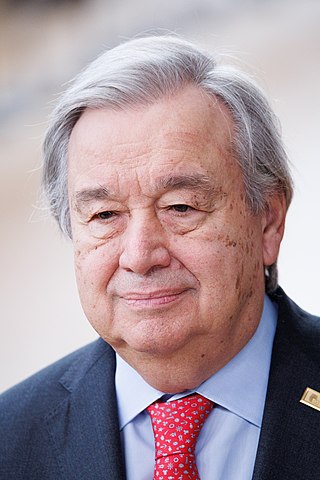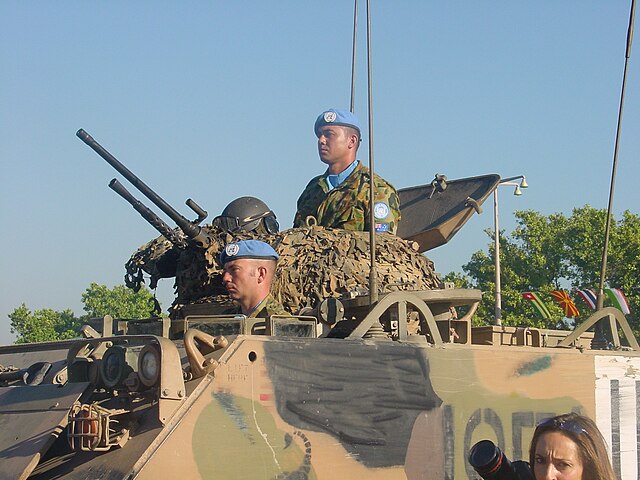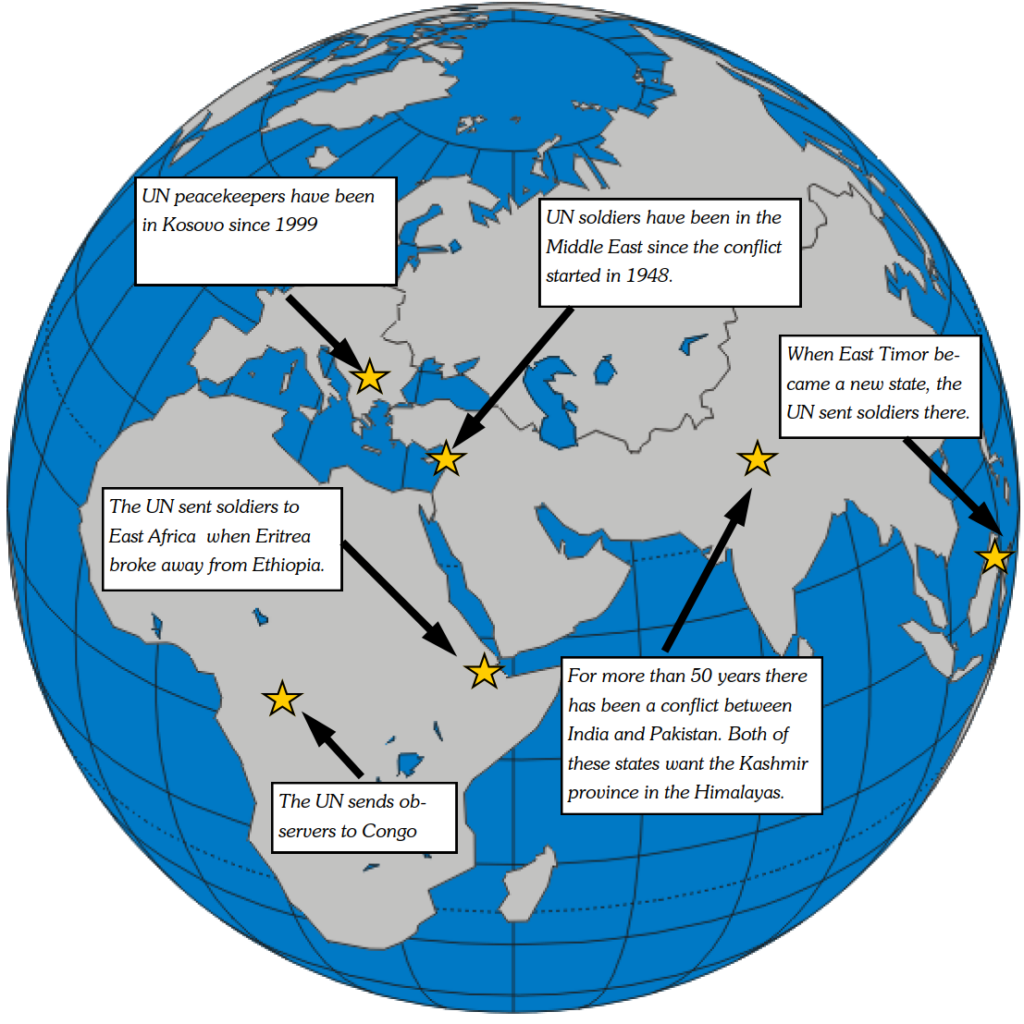Introduction
The United Nations is an international organisation of countries. It was created for many reasons:
- There should be peace and security in the world after the Second World War.
- Countries should be friendly to each other.
- Countries should help each other solve problems.
- Human rights should be respected everywhere in the world.
After the Second World War the allied countries got together to discuss in which ways such an organization could be created. In 1945 50 countries got together in San Francisco and signed an agreement that created the United Nations. The United States invited the new UN to set up its headquarters in New York. The building was finished in 1952 and has been the permanent seat of the UN until today.

UN headquarters in New York
Image: I, Padraic Ryan, CC BY-SA 3.0,
via Wikimedia Commons
Membership
Membership is open to all peace-loving nations. Today there are 193 countries in the UN – there are two members that are observers : the Vatican and Palestine.
Switzerland joined the UN in 2002 because the Swiss always wanted to be neutral.
UN member states – Date of membership
Image: (modified) PuebloUnited and Chanheigeorge,
Public domain, via Wikimedia Commons
The Main Organs of the UN
There are 5 main organs in the UN :
- The General Assembly
- The Security Council
- The Secretariat
- The International Court of Justice
- The Economic and Social Council
All countries get together in the General Assembly. It normally meets once a year, but it doesn’t have any real power. It discusses problems and recommends ways to solve them. In the General Assembly each country has one vote.
The Security Council is the main body of the UN. It gets together almost every day and it has the most power. Member countries must do what the Security Council decides. There are 15 members in this council – five of them are permanent : The United States, Russia, China, France and Great Britain. These countries have a right to veto anything. The other 10 members change all the time. They stay in the Security Council for 2 years.
The Security Council makes very important decisions and all the countries have to obey them. It tries to keep peace in the world and also tries to solve conflicts that endanger world peace. It also sends peacekeepers to countries where there is trouble.
The Secretary General has a lot of power in the UN. He is the highest official and is elected for five years by the General Assembly. He often travels around the world to settle conflicts between countries. At present, António Guterres is Secretary General of the UN. He was elected in 2017 and comes from Portugal .
The World Court makes decisions when two countries argue about something. It has independent judges that are elected by the UN.

Meeting room of the Security Council in New York
Image: Per Krohg, CC BY-SA 3.0,
via Wikimedia Commons

António Guterres
Image:European Commission (Christophe Licoppe), Attribution,
via Wikimedia Commons
Other Organisations and Agencies
The United Nations also have many other organisations The International Atomic Energy Agency (IAEA) tries to find out if countries have atomic weapons. Its seat is in Vienna. The World Health Organisation is a UN programme to help control diseases all over the world. UNICEF is an organisation to help children in need in poor countries.
The United Nations needs a lot of money to keep up all of these organisations and programmes. It gets most of its money from the world’s rich countries like the United States (about 25 %), Japan, Germany, France, Great Britain and Italy. A lot of the money is used for peacekeeping missions.
In the past few years—after the end of the Cold War—the United Nations have played a more important role in the world. In 1991, the UN voted to take action against Iraq, which invaded Kuwait. But if important countries do not agree in the Security Council, like in the Iraq War of 2003, the United Nations cannot do very much to prevent conflicts.

Australian peacekeepers in East Timor, Indonesia
Image: Geoffrey C. Gunn, CC BY 3.0,
via Wikimedia Commons
UN Peacekeepers
The United Nations Peacekeeping Forces are groups of soldiers who help keep peace in places of conflict. Most of the time they are observers or soldiers who don’t have so many weapons. Normally, they try to keep the enemies away from each other.
The first UN peacekeepers were sent to the Middle East in 1948 after the first war between Israel and its neighbours. After many weeks of war the UN peacekeepers were able to help make peace. Since then UN soldiers have helped patrol borders between Israel and Syria.
UN soldiers have also helped in Cyprus—a small island in the Mediterranean Sea that has mostly Greek people, but the northern part is settled by Turks. UN peacekeepers control a border that divides the north and the south of the island.
In the 1980s and 90s UN peacekeepers have helped keep peace in many countries. In the middle of the 1990s they were sent to former Yugoslavia to keep peace between the Serbs, Croats and Muslims.
UN peacekeepers are sent to a region only if the Security Council tells them to. They can only help keep peace if all the other countries agree and they may use their weapons only if they are attacked. Most of them wear a blue hat or a helmet so that you can tell if they are UN soldiers.
Since 1948 there have been 54 UN peacekeeping operations all over the world. Over 120 countries have sent soldiers.

UN peacekeeping missions
Achievements
In the 75 years of its existence , the United Nations have achieved a number of things . Here are some of them:
- The UN has helped many countries become democratic and peaceful states.
- The UN plays an important role in protecting our environment. The “Earth Summit” in Rio de Janeiro in 1992 was a big conference about climate control and other problems of our environment.
- The International Atomic Energy Agency is a UN organisation that controls the nuclear weapons of countries and sees to it that they don’t build an atomic bomb.
- Since 1950, the UN has given help to over 50 million refugees. These people had to leave their countries because of war, hunger or diseases.
- Africa is the poorest continent in our world. The UN has given African countries money and other kinds of help so that they can feed people and give them safe and clean water.
- UNICEF helps children who live in poverty and protects their rights.
- The FAO helps farmers develop ways of growing food in poor countries, so that millions of people have enough to eat.

UN aid workers help refugees
Image: Robert Palomares, U.S. Navy, Public domain,
via Wikimedia Commons
